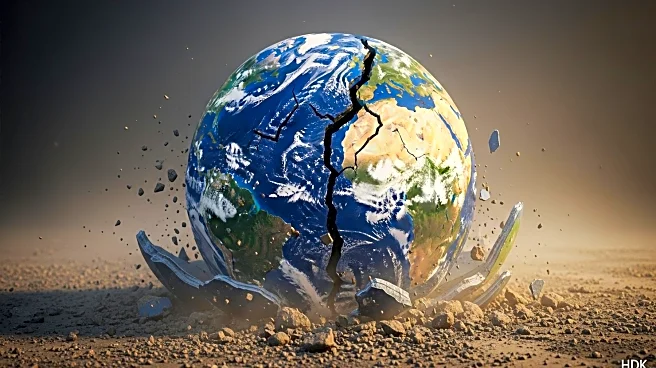What is the story about?
What's Happening?
A powerful earthquake struck eastern Afghanistan near the Pakistan border, resulting in significant destruction and loss of life. The earthquake, with a magnitude of 6.0, occurred late Sunday night in the province of Kunar, close to the city of Jalalabad in Nangarhar province. The U.S. Geological Survey reported the quake's epicenter was 27 kilometers east-northeast of Jalalabad and at a shallow depth of 8 kilometers, which contributed to the extensive damage. The Taliban government has reported that the death toll has risen to at least 800, with more than 2,500 people injured. Rescue operations are ongoing, with many areas still unable to report casualty figures due to blocked roads and disrupted communications. Helicopters have been deployed to transport the injured to hospitals, and aid workers are facing challenges reaching remote areas.
Why It's Important?
The earthquake has exacerbated existing humanitarian challenges in Afghanistan, a country already struggling with issues such as drought and the forced return of refugees. The disaster has cut off entire communities from accessing essential services, increasing the strain on the country's humanitarian response capabilities. International organizations, including the United Nations and the International Federation of Red Cross and Red Crescent Societies, have highlighted the urgent need for search and rescue support, emergency healthcare, food, clean water, and road access restoration. The event underscores the vulnerability of Afghanistan's infrastructure and the need for international aid to address the immediate and long-term impacts of such natural disasters.
What's Next?
Efforts to provide relief and support to affected areas are underway, with international organizations calling for increased donor support to aid the recovery process. The Taliban government and aid agencies are working to reach isolated communities and assess the full extent of the damage. The international community's response will be crucial in addressing the immediate needs and supporting Afghanistan's recovery. The earthquake's impact may lead to increased international focus on Afghanistan's humanitarian situation, potentially influencing future policy and aid decisions.
Beyond the Headlines
The earthquake highlights the broader challenges faced by Afghanistan, including the need for improved infrastructure and disaster preparedness. The country's reliance on international aid and the ongoing political and economic instability further complicate recovery efforts. The disaster may also affect regional dynamics, as neighboring countries like Pakistan express willingness to provide support despite recent tensions over refugee expulsions. The event could prompt discussions on regional cooperation and the role of international organizations in addressing humanitarian crises.















